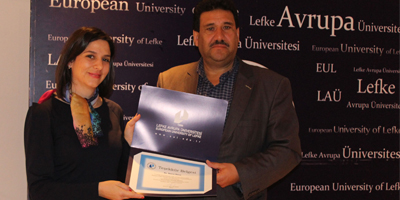“Public Administration Model in the EU” themed conference held at EUL
European University of Lefke (EUL) Faculty of Economic and Administrative Sciences Department of Public Administration organized a conference themed “Public Administration Model in the EU”. Burcu Barın, Senior Expert of T.R.N.C Prime Ministry EU Coordination Centre attended the conference as a speaker.
Evaluating the Public Administration Model in the EU in terms of food safety, “EU Public Administration Model”, “Administrative Field of Europe” and “Administrative Principles and Morals of Europe” formed a framework for Barın’s speech.
Barın: Differences in public administration models of EU member states are accepted
Barın stressed the importance of the subsidiarity principle in determining the implementation of services in the European Union by the Union or center, at a regional and local level. Addressing the European approach of public administration, Barın evaluated the existence of standard public administration structures at the level of the member states and the impact of the integration process to the public administration structures of countries. In this concept, touching upon the concept of EU Legal Acquis, Barın stated that the acquis does not establish any criteria on public administration models of countries and added that differences in public administration models of EU member states are accepted.Shefurther stated that countries maintain specific structures of public administration models under certain principles.
Barın said that “Countries with different traditions and managerial structures must comply with established horizontal principles however with the emergence of difficulties in the 5th enlargement process, the adoption of specific standards for public administration structures of member states became necessary for participation”. Pointing out that by this means, the principles of horizontal public administration are determined, Barın said that acceptance of these principles pave the way for the establishment of “Administrative Field of Europe”.
Touching upon the concept of “Administrative Capacity”, Barın describe this concept as have the necessary quality personnel and financial competence for the full and effective implementation of the EU Acquis and explained the concepts of “Vertical Administrative Capacity” and “Horizontal Administrative Capacity”.Shefurther stated that while a great importance is attached on the concept of “Vertical Administrative Capacity”, necessary importance is not given to the concept of “Horizontal Administrative Capacity” and added that European Commission now focuses on the concept of Vertical (Sectorial) Administrative Capacity.
Barın also touched upon 1998 and 1999 SIGMA reports and said that according to the 1998 SIGMA report, the need for harmonization could not be fully achieved, in line with the principle of subsidiarity, the national public administration structures were shaped by member states, the differences in implementation were problematic and the problems could spread to other member states, and the institutional configurations should progress to the EU Acquis with National Adaptation Programs.Shealso said that according to this context of the SIGMA 1998 report, member States could decide which tasks will be divided between private or public institutions.
Barın also said that according to the SIGMA 1999 report EU institutions cannot operate in place of national institutions but need to cooperate and stated that national institutions are responsible of implementing the EU decisions. Pointing out that national administration structures have to be confidential, transparent, and democratic, Barın said that the EU has the power to influence them even if they do not have direct authority over national government structures.Shefurther said that as a result of these reports and principles Administrative Field of Europe was established.
Touching upon the “Administrative Principles and Morals of Europe”, Barın emphasized 16 principles and listed these principles as; legitimacy, accuracy, impartiality, inclusiveness, openness, transparency, citizenship, responsiveness, accessibility, efficiency, effectiveness, sustainability, vision, reflection, innovation, accountability
The issue of food safety is implemented in the context of common principles by the specific public administration structure of each member state of the EU general rules
Baron, who exemplified the implementation of the European public administration model, which she explained theoretically, in the context of food safety and evaluated the EU General Food Law, emphasized the responsibilities of the member states in practice. In this context, considering the implementation of the rules of the Union by the public administration of the member state as an important example of the issue of food safety, Barın said that the centralization of national public administration structures in the context of the implementation of EU Food Law in the field of food safety has been transferred from the local authorities to the central governments. Talking about the applications of the member states, Barın stated that the general rules of the EU on food safety are applied in the context of common principles by the specific public administration structure of each member state and added that these practices are shown as examples of non-uniform implementation models. Touching upon the harmonization processes of the European Union, Barın emphasized the necessity of the establishment of various managerial systems in order to ensure the harmonization of the TRNC with the European Administrative Area and Managerial Capacity.
It is concluded that the EU has not yet developed a standard model of public administration for member countries; various principles and values were adopted in the course of time; in the implementation of the acquis, the member states carried out their own traditional structures and needs; the member states should create reliable managerial structures and that these structures must have the capacity to ensure compliance with national policies and Union policies. Barın alo said that “The European Administrative Area and the evolving Europeanization process make the harmonization of EU public administrations in the context of values and principles inevitable”. Barın further stated that within the context of the lack of a clear timetable for the TRNC, the internal and external political conditions and the legal alignment of the bureaucracy and the lack of direct trade with the EU are seen as problematic areas.
At the end of the conference Dean of Faculty of Economic and Administrative Sciences Prof. Dr. Okan Veli Şafaklı presented a certificate of appreciation to Burcu Barın.

